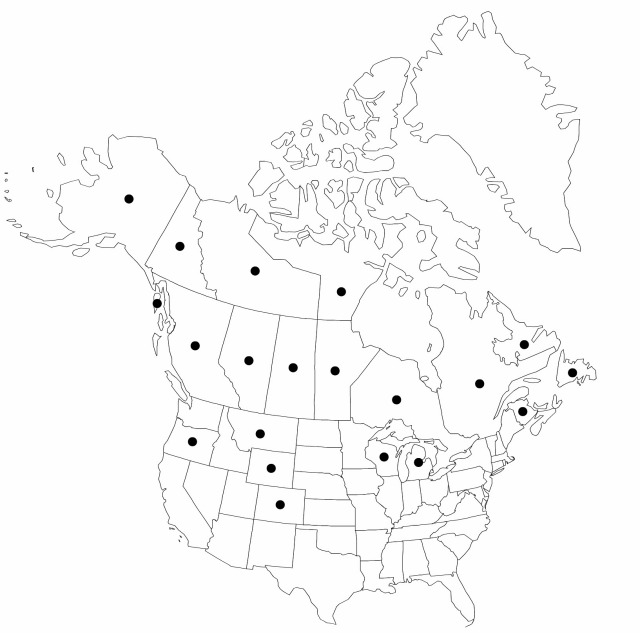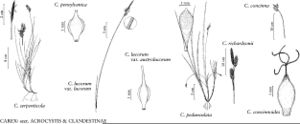Difference between revisions of "Carex concinna"
in J. Franklin et al., Narr. Journey Polar Sea, 751. 1823.
FNA>Volume Importer |
imported>Volume Importer |
||
| (One intermediate revision by the same user not shown) | |||
| Line 1: | Line 1: | ||
{{Treatment/ID | {{Treatment/ID | ||
|accepted_name=Carex concinna | |accepted_name=Carex concinna | ||
| − | |accepted_authority=R. Brown | + | |accepted_authority=R. Brown |
|publications={{Treatment/Publication | |publications={{Treatment/Publication | ||
|title=in J. Franklin et al., Narr. Journey Polar Sea, | |title=in J. Franklin et al., Narr. Journey Polar Sea, | ||
| Line 8: | Line 8: | ||
}} | }} | ||
|common_names=Northern elegant sedge;carex élégant | |common_names=Northern elegant sedge;carex élégant | ||
| + | |special_status={{Treatment/ID/Special_status | ||
| + | |code=F | ||
| + | |label=Illustrated | ||
| + | }}{{Treatment/ID/Special_status | ||
| + | |code=E | ||
| + | |label=Endemic | ||
| + | }} | ||
|basionyms= | |basionyms= | ||
|synonyms= | |synonyms= | ||
| Line 33: | Line 40: | ||
-->{{#Taxon: | -->{{#Taxon: | ||
name=Carex concinna | name=Carex concinna | ||
| − | |authority=R. Brown | + | |authority=R. Brown |
|rank=species | |rank=species | ||
|parent rank=section | |parent rank=section | ||
| Line 46: | Line 53: | ||
|publication title=in J. Franklin et al., Narr. Journey Polar Sea, | |publication title=in J. Franklin et al., Narr. Journey Polar Sea, | ||
|publication year=1823 | |publication year=1823 | ||
| − | |special status= | + | |special status=Illustrated;Endemic |
| − | |source xml=https:// | + | |source xml=https://bitbucket.org/aafc-mbb/fna-data-curation/src/2e0870ddd59836b60bcf96646a41e87ea5a5943a/coarse_grained_fna_xml/V23/V23_1038.xml |
|genus=Carex | |genus=Carex | ||
|section=Carex sect. Clandestinae | |section=Carex sect. Clandestinae | ||
Latest revision as of 20:38, 5 November 2020
Plants densely cespitose, short-rhizomatous. Culms 5.5–20 cm. Leaves: basal sheaths reddish brown, blades mostly basal, pale green, shorter than culms, thin, 1–3.1 mm wide. Inflorescences: peduncles of proximal spikes short; peduncles of terminal staminate spikes 1–3.1 mm; proximal bracts short-sheathing; pistillate spikes 2–3, emerging from cauline nodes, aggregated, ascending, ovoid to ellipsoid; terminal staminate spikes 5–6.8 × 1.1–1.5 mm. Scales: pistillate scales reddish brown, ovate, apex obtuse, minutely ciliate. Anthers 1.3–1.4 mm; staminate scales dark reddish brown, ovate, margins white, apex obtuse to rounded, scarious. Perigynia ellipsoid, 2.3–3.3 × 1.1–1.4 mm, base cuneate, pubescent with coarse, wrinkled white hairs; beak straight, 0.3–0.4 mm. Stigmas 3, thin, flexuous, strongly papillose. Achenes ellipsoid, 1.7–2.1 × 1–1.3 mm. 2n = 54.
Phenology: Fruiting spring–summer (late May–late Jul).
Habitat: Moist to dry meadows, riverbanks, thickets, flood plains, and open spruce, pine, cedar, birch, aspen, and willow woodlands, usually on calcareous substrates
Elevation: 0–3000 m
Distribution

Alta., B.C., Man., N.B., Nfld. and Labr., N.W.T., Nunavut, Ont., Que., Sask., Yukon, Alaska, Colo., Mich., Mont., Oreg., Wis., Wyo.
Discussion
Carex concinna is common in northern Canada and Alaska, particularly in the western mountains in the montane zone. It is often abundant, along with C. richardsonii, on open gravelly or sandy banks of spring flood channels. Superficially, C. concinna looks quite similar to C. deflexa Hornemann and C. rossii Boott of sect. Acrocystis. It differs from them in its strongly sheathing, short-bladed bracts, perigynium indument of coarse, wrinkled hairs, and minutely ciliate pistillate scale apices.
Selected References
None.
